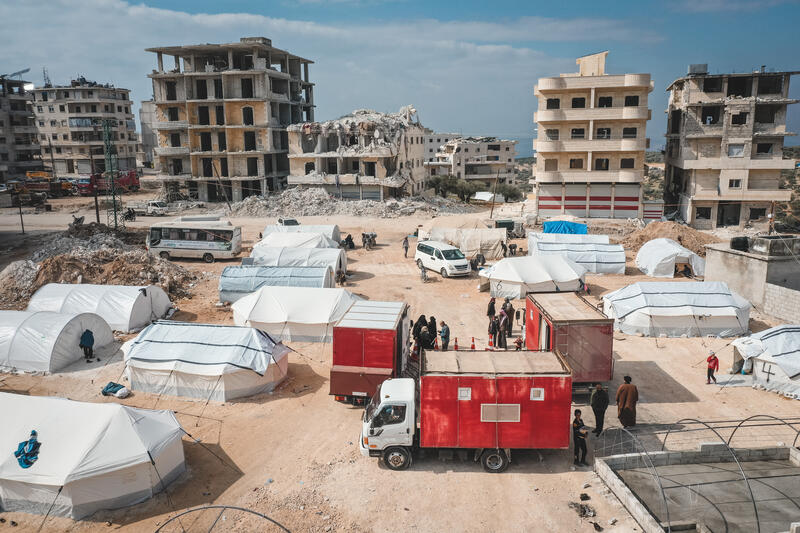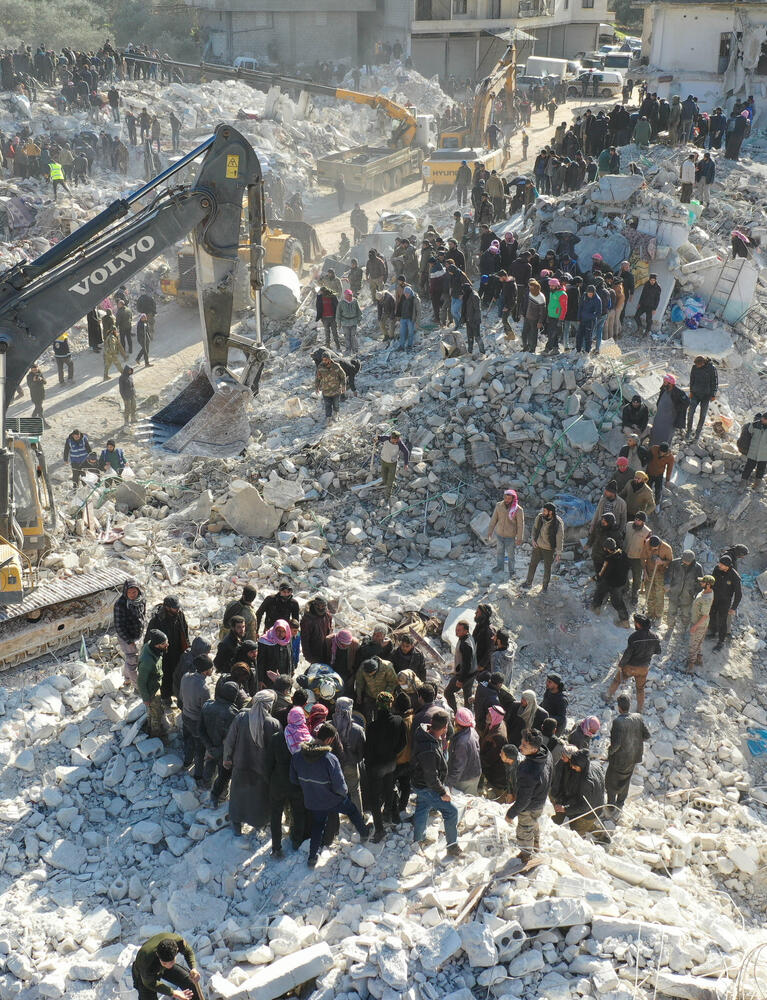Report on MSF response January 2024
Summary
Two powerful earthquakes, and a number of often strong aftershocks, hit the region of southern Türkiye and northwestern Syria on 6 February 2023. Médecins Sans Frontières (MSF) teams swung into action to respond in Syria within hours, and in the days after in Türkiye, working through local partners. In the days and weeks after the earthquakes, we provided medical care and the first of essential items, including blankets, and hygiene and cooking kits, to people who had been displaced in both countries. Our response evolved in the months after, when we improved water and sanitation services, reconstructed damaged health facilities and provided mental health care to people traumatised by the events and by the losses they had experienced. Our response through our partners in Türkiye finished at the end of May; in Syria, six months after the quakes, we integrated any ongoing response into our regular projects.
MSF’s activities in Syria and Türkiye before February 2023
Syria
MSF has worked in Syria since 2009. We operate in Syria in the country’s northwest and northeast, given access constraints and insecurity elsewhere. Our teams provide medical services, including trauma and wound care, maternal and child health, treatment for chronic diseases and sexual violence, and mental health support, through both fixed and mobile facilities.
Türkiye
MSF first worked in Türkiye in 1999. In June 2016, our authorisation to work directly in Türkiye expired; despite our best efforts, it has not been renewed. In the years since, we provided technical and financial support to local organisations, who provided general and mental health care and referral services to the large community of mostly Syrian refugees and asylum seekers. Due to the ongoing administrative challenges, we ended support for these activities by December 2022.
Earthquakes
On 6 February 2023, two earthquakes struck southern Türkiye and northwestern Syria. With the first occurring just after 4 am local time, the 7.8 and 7.7 magnitude earthquakes struck nine hours apart. The quakes, and their aftershocks, killed over 59,000 people, most of whom in Türkiye. An estimated 8 million people were displaced across both countries in the days after the earthquakes.
In Syria, the earthquakes exacerbated the already precarious humanitarian situation for people in the country’s northwest, including in Idlib and Aleppo governorates, where 13 years of war have profoundly impacted people’s access to healthcare and living conditions. The war forced thousands of people to flee their homes and live in often horrendous conditions in displaced people’s camps scattered across the region. The earthquakes damaged 55 medical facilities in Syria and completely destroyed several others, further limiting access to medical care.
Sadly, the earthquake claimed the life of an MSF staff member, found under the rubble of his home in Idlib, northwest Syria. Other MSF staff sadly lost dear family members.
MSF response to the earthquakes
Türkiye
Given our administrative constraints, all MSF relief activities in Türkiye were carried out by supporting local organisations, including Imece Inisiyatifi, Yardım Konvoyu, Maya Vakfı, and others. MSF-supported NGOs were active in Adıyaman, Gaziantep, Hatay, Kahramanmaraş, Kilis, and Malatya provinces in Türkiye.
In February and March, through partner local organisations, we donated and distributed medical and logistics supplies, and food and water. We also distributed hygiene kits and relief items, including blankets, electrical stoves, and thermal undergarments, to help people withstand the cold temperatures.
In the early part of the response, teams supported water and sanitation needs by constructing showers and toilets in makeshift camps.
The severity of the earthquakes and the huge loss of lives and property left people traumatised. In March, April and May, the local organisations that our teams supported provided psychosocial assistance and mental health care to a wide range of people affected by the earthquakes: Turkish healthcare workers, volunteers, search and rescue teams, children and adults. This assistance was provided through both individual and group work; psychosocial support can take many different forms, including, for example, simple activities which benefits children, such as drawing, dancing or listening to music.
At the end of May, with most of the acute and emergency needs having been met in Türkiye, MSF ended our activities.
MSF response in figures
In response to the earthquake in Türkiye, MSF teams (through our local partners) provided:
- 4.3 million litres of water
- 38,154 hygiene kits
- 390,500 meals
- 10,100 people with psychosocial support through group or individual sessions
- 9,171 blankets
- 2,192 tents and tarpaulins
- 350 toilets
- 173 showers
- 96.6 tons of fruits and vegetables
- 65 containers
- 61 water tanks
- 53.1 tons of firewood
- one X-ray machine to a hospital in Kahramanmaraş
- one water pump and tanks to the Hatay Training and Research Hospital.
Expenditure – €11.84 million
2024 outlook – none forecasted, given closed activities.
Syria
Having a long-established presence in northwestern Syria, we launched our emergency response plan in the region less than three hours after the first earthquake and put our staff on alert.
In the first few hours after the quakes, medical personnel were working around the clock to respond to the huge numbers of wounded arriving at facilities, treating around 200 people. We also sent our ambulances to assist people in northern Idlib. That first day, we donated emergency medical kits to 23 health facilities across Idlib and governorates, and sent our medical staff to reinforce their teams. With winter having set in, we also donated blankets and essential items to displaced people.
In the weeks and first months after the earthquake, we shifted focus towards providing shelter, food and relief items to people, ensured access to healthcare, and shored up water and sanitation services. We provided ambulances to facilitate the referral of patients to hospitals. MSF provided medical staff – including our surgeons from our burns hospital in Atmeh – to bolster the capacity of care being provided at clinics and hospitals. We also set up mobile clinics in shelters and reception camps to provide essential medical services and first aid for mental health.
Our teams brought in over 40 trucks of medical and non-medical items for people in northwest Syria; we made several donations of goods and equipment. This includes two donations to the Syrian Arab Red Crescent (SARC) of 35 m3 of medical kits, 50 m3 of essential items, 30,000 units of baby milk, 234 family tents and three surgical kits, to reach people in areas where we do not have a presence. Our hospital in Atmeh, which usually specialises in caring for people with severe burns, made numerous donations of medical and non-medical equipment to 30 hospitals in the region. We also sent medical equipment to around 10 hospitals in places including Bab Al-Hawa, Darat Izza, Idlib, and Atarib.
In April and May, our teams boosted care for longer-term medical needs, especially for mental health. Our teams ran recreational and psychological aid activities, especially for children, and continued mental health consultations during mobile clinics to camps. We also supported a hospital in Idlib governorate with surgical staff to provide follow-up and reconstructive surgeries to people severely injured in the earthquakes.
We started to look at and focus on long-term strategic activities to ensure continuous and sustainable provision of healthcare in northwest Syria. This was especially important, as the earthquake exacerbated a dire healthcare situation which, pre-earthquakes, featured underfunded medical facilities and limited services. In response, we rehabilitated three hospitals and healthcare clinics in Idlib and plan to construct a new maternity centre in Jindires.
In August, we continued to provide essential medical services, and alleviate the hardships endured by displaced people in the most affected areas such as Jindires, Sarmada, Armanaz, Jisr Al-Shughur, Al-Maland, Harim, and Salqin. We expanded our services by pivoting to provide orthopaedic care, training orthopaedic surgeons, and making improvements to infection prevention and control measures in an orthopaedic hospital. Acknowledging the psychological toll of the earthquakes, we extended our reach on mental health support, recruiting extra staff.
We also maintained our efforts to rehabilitate or improve healthcare facilities in Idlib and Aleppo, including constructing an extension to the Mashad Ruhin medical centre to accommodate the influx of people. We also provided a doctor and a nurse to bolster the medical staff at the facility.
Six months after the earthquakes, as the recovery process continued, we committed to our ongoing efforts by integrating them into our regular activities in northwest Syria, ending the emergency phase of the response.
MSF response in figures
- 8 million litres of clean water provided
- 198,477 outpatient consultations in mobile clinics and health facilities
- 110,835 relief items distributed, including hygiene kits, kitchen kits, and menstrual kits for women
- 38,255 loaves of bread
- 28,645 blankets
- 8,026 mental health consultations
- 8,005 mattresses
- 6,411 tents
- 1,000 water tanks installed
- 620 latrines and 90 showers maintained.
Expenditure – €17.1 million emergency funds. €9.4 million regular programmes funds. Total: €26.5 million.
HR – 3 international staff, 35 locally hired staff, 87 partner staff (OCBA only)

2024 outlook
Budget forecast for activities in NW Syria in 2024 – €23 million.
The majority of this is for regular programmes, including earthquake response activities that were integrated into regular programmes during 2023. This amount also includes €5 million budgeted to allow Operational Centre Barcelona to build the maternity ward at Jindires hospital (planned as part of earthquake response, but implementation extended into 2024).



